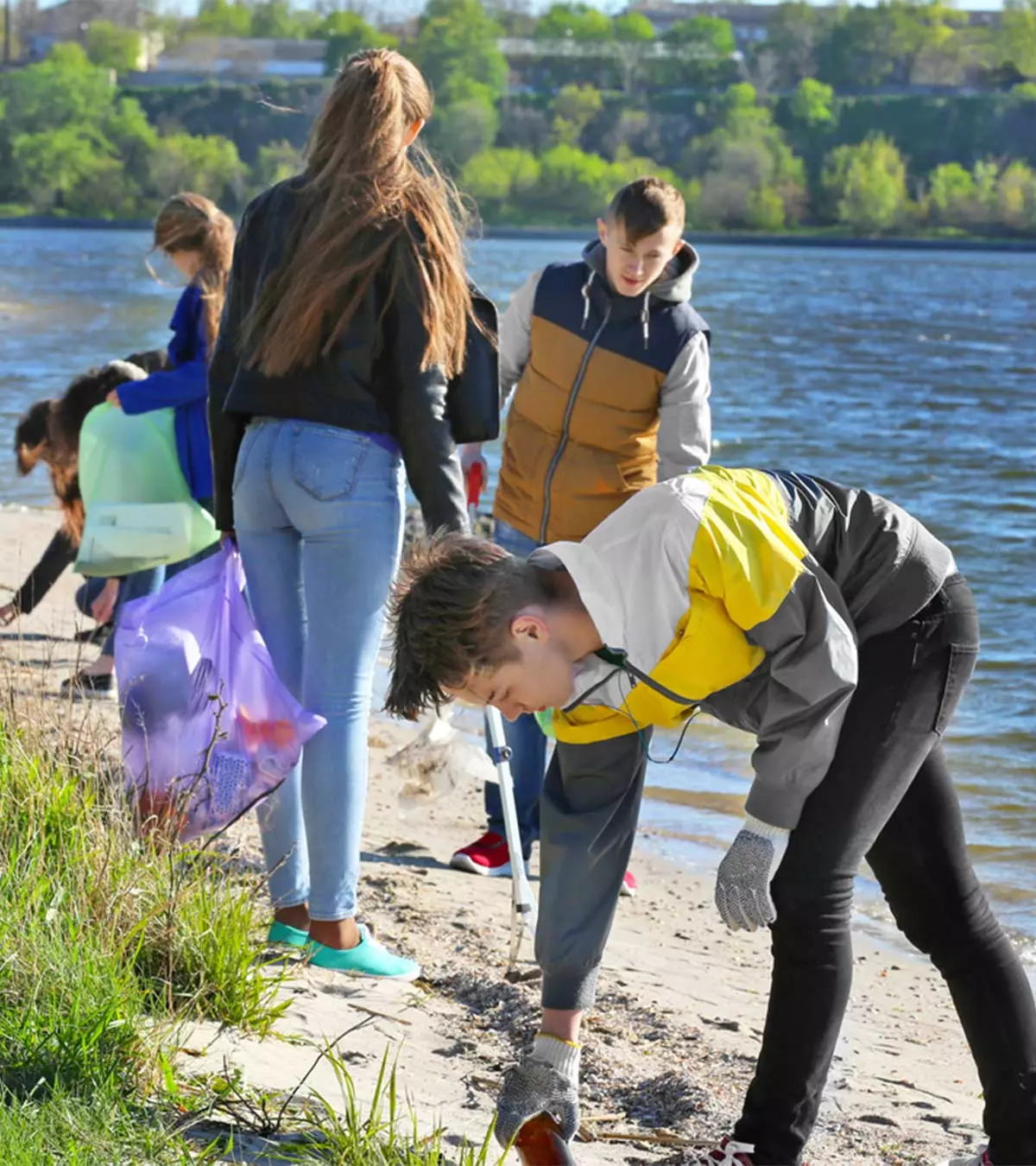
Image: Shutterstock
Teen volunteer opportunities are the best way to imbibe the values of empathy and responsibility in them. Moreover, witnessing these enriching experiences at a tender age inspires them to continue doing it even as adults. Teenagers are not only creative, but they welcome ideas and suggestions as they are open-minded. In today’s world, where everybody is obsessed with “wants” and “achievements,” it is essential for parents to ensure their children grow up with the emotions of gratitude, empathy, and kindness.
Key Pointers
- Volunteering activities inculcate the emotions of gratitude and empathy in children.
- Volunteering to be a library mentor or distribute food may help them explore their interests.
- Raising funds for a cause, working at a nursing home, joining the American Red Cross, and many such activities can help children grow into responsible human beings.
Why Teens Should Take Up Volunteer Opportunities
Volunteering for the benefit of others, especially the less fortunate, has massive benefits for teens. A cross-sectional study based on data from the 2019 to 2025 National Survey of Children’s Health found that “volunteering was associated with higher odds of excellent or very good health and flourishing in children and adolescents, and with lower odds of anxiety in adolescents and behavioral problems in children and adolescents (1).” Also, teens who volunteer even an hour or so a week are 50% less likely to abuse substances, become pregnant, or participate in other illicit or destructive activities (2). Here are additional ways in which volunteering opportunities benefit teenagers.
- Helps them make a difference: Volunteering is an excellent way to show teens first-hand what they can do. Playing with foster kittens, cleaning a beach or neighborhood, or feeding people without housing demonstrates that their time and effort have a greater impact on those around them. They also learn that even the smallest acts of love and kindness count. Teens who volunteer experience better mental health, as volunteering helps them feel more in control and boosts their self-esteem, self-efficacy, and overall positivity (3).
- Helps them build appreciation: You can let your teen know that numerous animals and people out there need help. Getting out there and understanding the predicament of families living from hand to mouth can give them perspective. Soon, not getting their new pair of jeans or a new gadget won’t seem as bad. They will likely learn to respect others, be helpful and kind, and relate to different people (2).
- Helps them know their worth: In a society obsessed with academic achievement, teens need to know that report cards aren’t the only thing that reflects their self-worth. As a parent, you want a well-rounded child, so you should encourage them to look beyond academics. Volunteering is a way for every teen to feel competent. However, if school performance is a major concern for you, remember that the teens who volunteer are less likely to fail in school or drop out and are more likely to get better grades, graduate, and vote (2) (3).
- Helps them widen their social circle: A teen’s social circle consists primarily of friends from school and family. Volunteering through teen volunteer organizations allows them to meet new people. Working in teams helps them learn how to communicate, behave, and mingle with people from different backgrounds. Volunteering lets them meet like-minded people who could positively impact their future. According to a study, building social skills and connections while volunteering can positively impact teens’ academic and professional success, regardless of whether they volunteer by choice or requirement (4).

- Helps them explore and discover interests: While picking from different volunteering opportunities, your teen can select an area that interests them. For instance, if they are interested in teaching, they can choose to volunteer as a tutor. If they’re passionate about animals, they can help at an animal shelter. If they’re undecided, they can try their hands at something new and discover untapped interests.
- Helps them develop life skills: Volunteering can help children develop problem-solving, communication, teamwork, collaboration, and many more skills that are vital for them to succeed. Furthermore, volunteering is a robust, real-world experience that they can add to their resumes. It shows that they are civically engaged, take on challenging work, and thrive in team settings.
Carol Silva, a teen and a student at UW-Madison, shares in her blog her personal experience of volunteering while shifting to Manila. She says, “I learned about how much I love volunteering: I loved the chance to help people, to build an authentic connection with others, and to incorporate myself into the community to make a difference. It was the perfect thing to discover at that point in my life when I was looking for meaning and validation. Volunteering helped me override my bitterness and replace it with feelings of happiness and fulfillment.”
She further adds that she got so engrossed in volunteering that she later joined different volunteering programs and gained confidence in helping others in the community (i).
 Did you know?
Did you know?28+ Volunteer Opportunities For Teenagers
In the US, teens volunteer more than 2.4 billion hours annually. Among 13.3 million youth, 59.3% volunteer above 3.5 hours per week on average (2). Given these figures, volunteering is one of the key activities teens often like to explore. If your teen is interested in volunteering, here are a few opportunities they could take up.
1. Volunteer at a library
Does your child love books? If yes, volunteering at a library is the perfect option. During their time volunteering, they can help younger students with their homework, help visitors use the computer or locate books, help repair books, and help organize or reshelve books. It can also help them stay informed. Moreover, it is a peaceful activity to indulge in after a hectic week.
2. Help a local food bank

Food banks always welcome donations and new volunteers. They provide perfect volunteering opportunities for those who are interested in helping the homeless. Your teen would be involved in anything, from preparing meals to managing inventory, working behind the scenes to repackage donated food items, serving food, and carrying boxes.
While it’s not as easy as it seems, it certainly is rewarding. It helps the local community and ensures families in need are getting good, non-perishable food. If your teen doesn’t have the time, they can always take part in a one-off fundraiser.
3. Help at a soup kitchen
A soup kitchen is one of the places where the hungry can get free or affordable meals.
Most soup kitchens run primarily on donations and the generosity of people. As a soup kitchen volunteer, your child may be made to clean the tables and utensils, help distribute food, cook food, and more.
4. Volunteer for meals on wheels
By volunteering for Meals on Wheels, your teen will deliver nutritious meals to the elderly or the disabled. It’s perfect for teens who have just received their driving license and love any reason to get behind the wheel! They can make a massive impact in a short amount of time. Alternatively, your teen can also volunteer in their kitchen and prepare meals for delivery. With a simple gesture, your teen can bring millions of smiles to people’s lives.
5. Work with Habitat for Humanity
Habitat for Humanity’s mission is to build or improve a place that someone could call home. Besides helping the community, your teen will learn valuable skills such as repairing, fundraising, painting, and building. You can sign them up for long-term projects or a one-time program.
6. Join the American Red Cross
The American Red Cross is an organization that provides disaster relief, emergency assistance, and disaster preparedness education. Volunteering with the American Red Cross is a rewarding experience that allows your teen to utilize their talents to serve the community. It is also a great way to teach them the importance of work.
7. Volunteer at a local hospital

Local hospitals are always on the lookout for a helping hand. Whether it’s chatting with residents, greeting visitors, running the gift shop, or transporting patients to the cafeteria, a little help goes a long way in bringing a smile to people around them! A few places may have an age limit and require your teen to get basic training and commit their time each week. So, ensure your teen is in it for the long haul.
8. Tutor younger children
Even if your teen isn’t interested in becoming a teacher, they can help younger students who need a little extra support at school and in life. As a volunteer, they can conduct after-school programs and help elementary or middle school students with their studies. A few hours of tutoring time a week can ensure younger children around your teen improve their performance. Teaching others is also a good way to cement your teen’s learning.
 Point to consider
Point to consider9. Help an elderly person
Your teen’s nana has no clue how to get around the latest technology. Being an expert at using apps, email, social media, and more, they can easily help the elderly who need help with these. Helping them out with computers or phones is great because it helps the elderly stay in touch with family and friends. Whether it’s their grandma or the neighbor down the street, helping an elderly person could be one of the best therapeutic activities for teens.
10. Care for pets at the animal shelter
Volunteering isn’t just about supporting our human friends. If you’re an animal lover, there’s nothing better than being surrounded by little furballs all day. Animal shelters and homeless shelters are the best places to volunteer. A typical day volunteering at an animal shelter would involve helping with the adoption process, feeding animals, cleaning up after animals, doing paperwork, and hosting events.
 Quick tip
Quick tip11. Clean up and maintain the parks
One of the most productive activities for teenagers who love the outdoors and wish to get their dose of vitamin D is to turn up to clean a forest or park and help in environmental conservation. National parks, city parks, and metro parks can use an extra hand in the park clean-up process to maintain and keep the public space tidy. If it interests your teen, sign them up for future cleanups too.
12. Join a Key Club
Key Club is one of the oldest and largest service programs specifically for high school students. Their activities include everything from tutoring programs, food drives, and clean-up projects. If your teen’s high school doesn’t have one, they can visit their website and find a community-based group.
13. Work at a nursing home
Lending a helping hand at a local nursing home is a great way to help the elderly. As a volunteer, your teen’s elderly care duties will include cleaning up after meals, helping the elderly with daily tasks, delivering meals, and engaging the residents by watching movies with them, talking to them, or reading to them.
14. Volunteer at a summer camp

A job as a ‘Camp Counselor’ or a ‘Counselor-in-Training’ is a great fit for teens. It teaches them organization skills by training under experts. Teenagers can learn communication skills and benefit from the real-time feedback that they receive from children and parents. It is also an excellent opportunity to learn outdoor support skills, such as CPR and first aid plus, and enjoy different games and activities.
15. Teach English
Teens can join a Global Volunteer program to teach English to people of other countries. This could be one of the most fun activities for teens, as it involves traveling, mainly to Asia or Eastern Europe, and interacting with the locals of the host country. Alternatively, they can also take up the program online. The opportunity can help teenagers pick up essential teaching skills and benefit from a cultural exchange.
16. Donate old clothes or toys
How about some community service for the teenage soul? Several non-governmental organizations require volunteers to run their donation drives or charity events. Teens can collect old clothes and toys from the neighborhood and transport them to a central location for the NGO. The opportunity can help them understand and learn coordination and management skills.
17. Volunteer for a crisis hotline
Teenagers can volunteer for several crisis hotlines in their free time. These include suicide helplines, confidential crisis hotlines for LGBTQ+ youth, and more. Volunteers receive thorough training before picking up any key tasks or sensitive cases for the hotline. It is, therefore, a good opportunity for them to hone their communication skills and develop empathy and humility.
18. Raise funds for a cause
Fundraising is an important aspect of community work.
It involves strategic thinking and the application of good outreach and selling techniques. Teenagers can partake in a fundraiser for a cause that they are genuinely passionate about. It will help them develop essential life skills and understand the importance of managing their pocket money.
19. Be a reading mentor at the library
For those who love literature, volunteering at a library can be a great idea. Teenagers can work as reading mentors or assistants for younger children or those who are visually disabled. They can help the readers pick the right books, and even lead or organize storytelling events as part of a youth mentorship program.
20. Help younger students with homework after school

Tutoring could be one of the engaging social skills activities for teens. While tutoring, the teen has to help younger students in the community with their homework after school. This is a cool idea for those who are willing to explore their teaching aptitude. It can encourage teens to become responsible role models, participate in literacy programs, and mentor younger students and children.
21. Send holiday cards to military serving overseas
This is a creative way to spend time. Teenagers can make personalized holiday cards and other arts and crafts for military personnel serving overseas. They can either make these cards for another organization or create independent crafts and send them. This is a great way to show respect, care, and gratitude for the men and women who protect us and doubles as a creative assignment for teens.
22. Coach and staff at community sports events
Community sports programs are mainly targeted at children from underprivileged backgrounds. They entail very little or no fee and always need a helping hand, making them a great opportunity if you’re wondering how to make your teenager responsible. Your teens can volunteer to coach, mentor, or help at such programs. They can work as umpires, referees, trainers, or helpers. The goal is to learn while serving the community.
23. Provide support to the Special Olympics
Special Olympics programs regularly require volunteer support and help. Teenagers can join such programs as event coordinators, coaches, or helpers. They can even partake in a cross-border Special Olympics event to travel and experience other cultures.
24. Participate in a beach cleanup
Teens can associate with a local environmental organization for a beach conservation and clean-up drive. This is a great way to learn about ecology and contribute to its betterment in a hands-on manner. The opportunity involves outdoor activity and is a good platform to connect with environmentally conscious folks.
25. Support a marathon as a volunteer captain
A marathon requires careful planning and execution. Teenagers can join the event and help oversee tasks such as management of specific stations, handing down kits to participants, controlling the traffic, and assisting runners with the course map. It is an excellent opportunity to learn in a pressure-driven and fast-paced environment.
26. Join Code for Cause
Is your teen interested in coding? Sign them up with Code for Cause and help them use their technical knowledge to provide awareness, guidance, and training about the endless opportunities in the field of software to students and professionals.
27. Take part in a tree plantation drive
Let your child play their part in protecting the environment by volunteering in a tree plantation drive. Trees clean up the air we breathe, reduce climate change, and reduce pollution. In essence, the Earth needs trees. Your teen can join different volunteer groups or even plant trees around your home.
Audrey Hepburn once said, “As you grow older you will discover that you have two hands, one for helping yourself and one for helping others.”
28. The Humane Society
If your teenager is an animal lover, they can participate in the fight against animal cruelty by joining the Humane Society. The organization allows volunteers to provide hands-on care for animals at their temporary shelters, such as feeding, cleaning cages, restocking supplies, walking dogs, and socializing with animals under specific guidance. The Humane Society offers diverse opportunities for involvement, each with varying requirements, responsibilities, and commitment levels. They ensure that all volunteers receive the necessary guidance and training based on their needs. By participating, your teen will acquire valuable skills, take on new challenges, and become part of a community that advocates for ending animal cruelty.
29. Join a Youth Advisory Board
Many organizations value and seek young people’s input to improve their programs and services. By joining a Youth Advisory Board, teens can share their opinions, impact decisions, and help develop their communities while gaining valuable leadership experience. They can also learn the basics of planning, management, welfare, and resource allocation, which will benefit their professional lives in the future.
How To Start Volunteering
Volunteering is one of the best ways teenagers can experience the real world and learn to communicate with people outside their social circles. It can help develop their communication, teamwork, and leadership skills by inculcating empathy and patience and positively impacting their communities. So, if your teenager is keen on volunteering, here’s how you can get them started.
- Identify interests and skills: Help your teen determine what motivates them and where they can make a difference. Here are some questions that may help them narrow down to their top three interests:
- What is your passion? Do you enjoy working with animals, kids, or the environment?
- Do you want to build leadership, teamwork, or communication skills?
- Is volunteering in alignment with your teen’s career interests or higher education plans?
- Research volunteering opportunities: Look for organizations that match with your teen’s interests. Local community centers like libraries, hospitals, animal shelters, and non-profit organizations are some good options to explore. School-based programs, like Key Club, Interact, or National Honor Society, also offer volunteering opportunities. Online platforms like VolunteerMatch, DoSomething, and Points of Light also provide volunteering opportunities. Look for opportunities that give your teen flexibility if they have a hectic school schedule.
- Reach out and inquire: Once you’ve narrowed down your potential organizations, you have to reach out to them. Visit their website and look for the “Get Involved” or “Volunteer” section. Then, contact their volunteer coordinator and send them an email with a few questions, like:
- What volunteer roles do you have for teenagers?
- Do you have any age restrictions or requirements?
- How does my teen sign up?
- Complete the application: Many organizations need volunteers to fill out an application or registration form with basic information, availability, and reasons for wanting to volunteer. If your teen is under 18, you may need to submit parental consent. Finally, they will likely hold an orientation/training session your child will need to attend to learn the organization’s goals, guidelines, and safety protocols.
- Choose a commitment level: Go over your teen’s schedule and decide how much time they can commit realistically to volunteering. As a rule of thumb, choose one-time events if they want to try out different opportunities, short-term projects if they are exclusively volunteering during summer or school breaks, and long-term/ongoing projects if they want to build connections and skills over time. Help them start with a manageable schedule and gradually increase their involvement if they enjoy the work.
- Prepare for the first day: As a new volunteer, your teen must make a good first impression. They should follow the organization’s dress code, if there is any, bring identification, parent consent forms, or other supplies if needed, and arrive on time and be ready to participate. A positive attitude and willingness to learn goes a long way.
- Encourage learning and adaptation: Motivate your teen to ask questions and seek guidance if unsure about something. Tell them to observe and learn from experienced volunteers and be open to feedback and criticism. Encourage them to ask for new tasks to expand their skills.
- Track progress: Keep a record of your teenager’s volunteering hours, as many schools require these details for scholarships or graduation. Service hours are also helpful for resumes, portfolios, and college applications. Collect their supervisors’ contact information as it is useful for letters of recommendation. Also, ask your child to keep a note or journal reflecting on the volunteering experience. That is, if the role aligned with their interests, what skills they learned, and if they’d like to continue or do something different.
Frequently Asked Questions
1. Does volunteering improve grades?
Research by Henderson and Mapp suggests that volunteers are school assets and act as role models and motivators who exhibit good social skills and get better grades (5).
2. What is the youngest age to begin volunteering?
Different organizations have different volunteering ages. Some give volunteering opportunities to children as young as five (6). The UN youth volunteers are between the ages of 18 and 29 (7).
3. What should my teenage volunteers do if they feel uncomfortable or unsafe in a volunteer opportunity?
Teenage volunteers should trust their instincts and prioritize their safety and well-being by removing themselves from the situation. They can seek guidance from an expert supervisor or the organization’s representative to address their concerns or provide a different arrangement. Lastly, exploring other opportunities like volunteering at the local community centers or joining a different organization with their friends is better if they feel uncomfortable or unsafe in a volunteer opportunity.
4. What are the risks associated with my teenager who is volunteering?
Teenage volunteering under expert supervision does not possess any inherent risks. However, without proper guidance, they may be exposed to physical safety concerns, emotional or psychological risk, or violation of environmental regulations, which may largely depend on the nature of their volunteer activities.
5. Are there any legal considerations my teenagers should know when volunteering?
Yes, teenagers must know the legal considerations before volunteering at any organization. They need to be made aware of the legal formalities such as age restrictions, the importance of parental consent, work permit and labor laws regarding the activity involved, confidentiality and privacy of sensitive information, liability and insurance provided by the volunteering organization, and intellectual property and copyright laws.
6. Are there any special skills required to volunteer as a teenager?
Generally, teenage volunteering does not require special skills. However, good communication skills, compassion, selflessness, and dedication to work efficiently with others can help you contribute to the organization you are interested in.
7. How to choose the right volunteer opportunity?
Selecting the appropriate volunteer opportunity can be overwhelming. Consider your interests, the amount of time you can dedicate, and the skills you’d like to build to find a program that meets your requirements. It can also be helpful to talk to your parents or mentors to discover programs that match your goals and values.
8. How can volunteering affect my future job prospects?
Volunteering can boost your job prospects, as employers value candidates with volunteer experience for their initiative, teamwork, and community commitment. It also offers valuable networking opportunities, which can help you stand out from other applicants.
Teen volunteer opportunities are an excellent way of teaching them about the importance of giving back to the community, helping others, and being generous towards others. They may volunteer at a local food bank, join a charity that helps the poor, or look after pets at an animal shelter. Doing such activities also helps them stay engaged during their free time instead of simply sitting around and watching the television or scrolling through their phones. So, why not encourage your child to take up volunteering and help them develop a giving nature.
Infographic: Why Teens Should Take Up Volunteer Opportunities?
Volunteering is a way to give back to society. Letting children get involved with this activity early on helps them grow socially. It also makes them appreciate what they have and inspires them to work hard. In the following infographic, we have listed a few benefits of engaging teens in volunteering activities.
Some thing wrong with infographic shortcode. please verify shortcode syntax
Illustration: Interesting Volunteer Opportunities For Teenagers

Image: Stable Diffusion/MomJunction Design Team
Make a difference in your community through the selfless act of volunteering. Explore this informative video to discover where and how you can contribute.
Personal Experience: Source
MomJunction articles include first-hand experiences to provide you with better insights through real-life narratives. Here are the sources of personal accounts referenced in this article.
i. Engaging With Volunteering Through Reflection;https://medium.com/morgridgecenter/engaging-with-volunteering-through-reflection-6ce5caeb2d3a
References
- Kevin Lanza et al.; (2025); Volunteering Health and Well-being of Children and Adolescents in the United States.
https://pmc.ncbi.nlm.nih.gov/articles/PMC10230312/ - Young Volunteers: The Benefits of Community Service.
https://extension.unr.edu/publication.aspx?PubID=4307 - Cynthia W. Moore et al.; (1996); The effects of volunteering on the young volunteer.
https://www.researchgate.net/publication/258768263_The_effects_of_volunteering_on_the_young_volunteer - Jinho Kim et al.; (2018); Long-Term Consequences of Youth Volunteering: Voluntary Versus Involuntary Service.
https://pmc.ncbi.nlm.nih.gov/articles/PMC5612372/ - Volunteers are an Important Part of a System of Student and Learning Supports.
http://smhp.psych.ucla.edu/pdfdocs/vols.pdf - Youth Programs.
https://www.habitat.org/volunteer/near-you/youth-programs - Become a UN Youth Volunteer.
https://www.unv.org/become-un-youth-volunteer
Community Experiences
Join the conversation and become a part of our nurturing community! Share your stories, experiences, and insights to connect with fellow parents.
Read full bio of Katherine Paxton
Read full bio of Advaitaa Ravi
Read full bio of Harshita Makvana
Read full bio of Nisha Bharatan
















